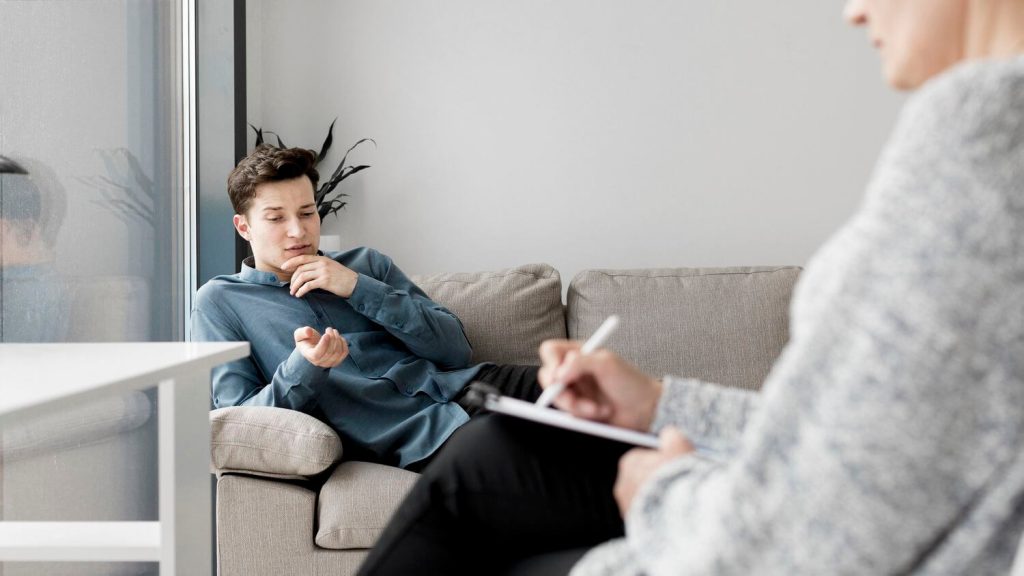College is a time of significant change. Starting an independent life and access to freedom is exciting for many young people. However, some students also turn to counseling centers for support. According to a survey by APA, about 61% of college students report anxiety, 49% have depression, and 45% are stressed. College is not without its challenges!
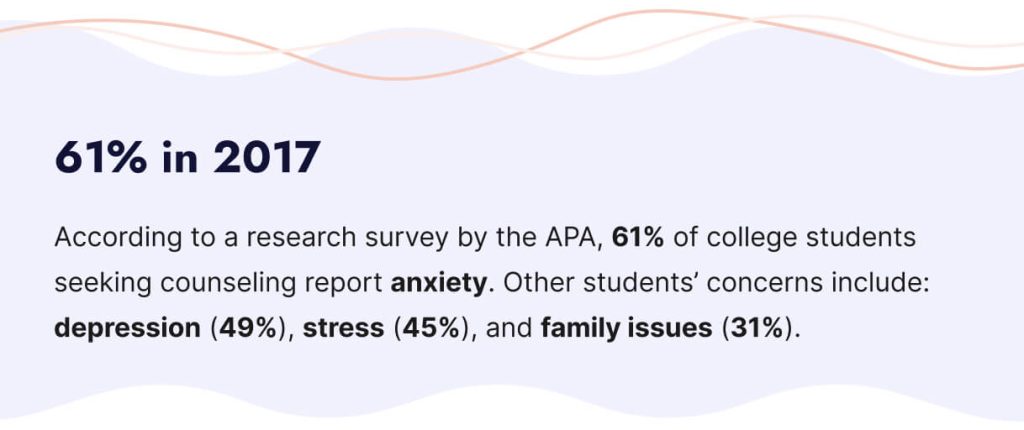
Many students have trouble adjusting to a new and hectic school routine, as well as new social dynamics and experiences experimenting with alcohol and drugs. Others report feeling depressed, and some even have suicidal thoughts. In fact, suicide is the third leading cause of death for 15-24-year-olds. According to a national survey, around 10.3% of college students have thought about suicide.
It is important for everyone to take care of their mental health. This article discusses how psychotherapy can help manage stress and depression in students. We also explore the benefits of psychotherapy and offer some tips for finding a good therapist.
🎓 Why Might College Life Be Stressful?
College life can be stressful because it is a completely new experience and is totally different from your years in high school. The adjustment period can be tough, particularly when students live away from home and are apart from their families.
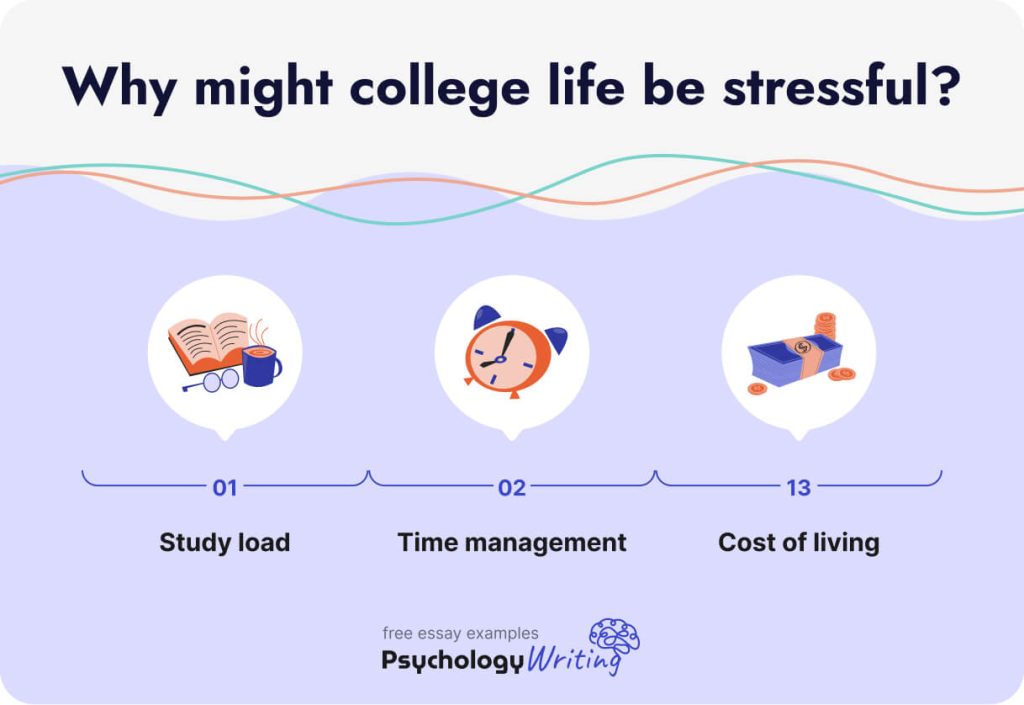
The teaching style also differs significantly between high school and college, and this takes time to get used to.
Here are some reasons why college can be quite stressful:
🔰 Do I Need Therapy? 9 Sure Signs for Students
One of the ways to manage stress and prevent suicide among students is through psychotherapy.
Here are 9 signs that might suggest you need therapy.

Sleep Issues
There is a close connection between sleep and mental health. Getting adequate sleep is essential for a healthy mental state. When you are sleep deprived, it will affect your psychological state.
Sleep issues can result from:
- Increased study load
- Rising responsibilities
- Regular partying
Conversely, excessive sleep is also a red flag as it could also be a sign of depression.
Overwhelming Homesickness
Starting college means leaving home, adjusting to a new environment, making new friends, and adapting to a new routine. Many students experience extreme loneliness and homesickness in their first year of college. While some cope quite well, others may feel isolated and plunge into a depression. If feelings of homesickness are overwhelming for you, therapy may help.
Relationship Issues
Many college or university students are in romantic relationships. Some may have left their lovers at home or started new relationships at school. Toxic and complicated relationships can mess up a person’s headspace or interfere with a student’s performance. Research shows that relationship problems are among the major reasons students seek therapy at mental health centers in college.
Other relationship issues could be family-related, where parents are controlling, or where old grudges exist between siblings.
Social Anxiety
Adjusting to a new space takes time. The absence of good old friends and personal space can make college even more challenging. Many students live in on-campus accommodations and must share rooms with their peers.
Social anxiety is a mental condition caused by environmental influences and stressful conditions. It is a good idea for students to seek help when facing social anxiety.
Self-blame
Stress in college students often leads to self-blame. A study of undergraduate college students revealed a connection between self-blame and stress. Many students fall victim to self-blame. These thoughts paralyze them from forming meaningful connections, trying new projects, or achieving their true potential. When feelings of self-blame become obsessive, therapy might be the best solution for self-acceptance.
Changes in Eating Habits
Students are at a greater risk of experiencing eating disorders during their first years in college. The challenges of coping with their new life, study workload, and peer pressure are all reasons for changes in eating habits. Anorexia and bulimia are common eating disorders affecting young college students.
Students who have a history of anxiety or depression or have self-esteem issues are at a higher risk of suffering from eating disorders.
The signs of eating disorders are:
- Extreme weight loss or gain
- Obsessive dieting
- Withdrawal from normal activities
Psychotherapy offers tools that can support students in overcoming disordered eating.
Emotional Instability
Emotional instability is a common problem among students. A study of Ukrainian students revealed that students who can’t control their emotions are mentally unhealthy. These students have disruptive responses, are not empathetic, and often can’t establish relationships with other students.
Frustration
College life is exciting.
With newfound freedom, many start to explore and try out new things. While exciting, it can also be a frustrating time. From experimenting with alcohol and drugs to romantic relationships and peer pressure from friends, students can have difficult experiences with harsh consequences.
It is crucial to overcome extreme feelings of frustration. To do so, seek help from a counselor.
Study Issues
One of the major red flags for college students is when their academic performance starts to drop. It is well known that stress reduces performance among students.
If you start to notice issues with your grades or reduced concentration levels during study sessions, seeking out psychotherapy might help resolve the issue.
✅ 4 Key Benefits of Therapy for College Students
As much as college is exciting, it is a challenging experience. It comes with extreme highs and depressive lows. Through the rollercoaster of college life, many students are figuring themselves out.
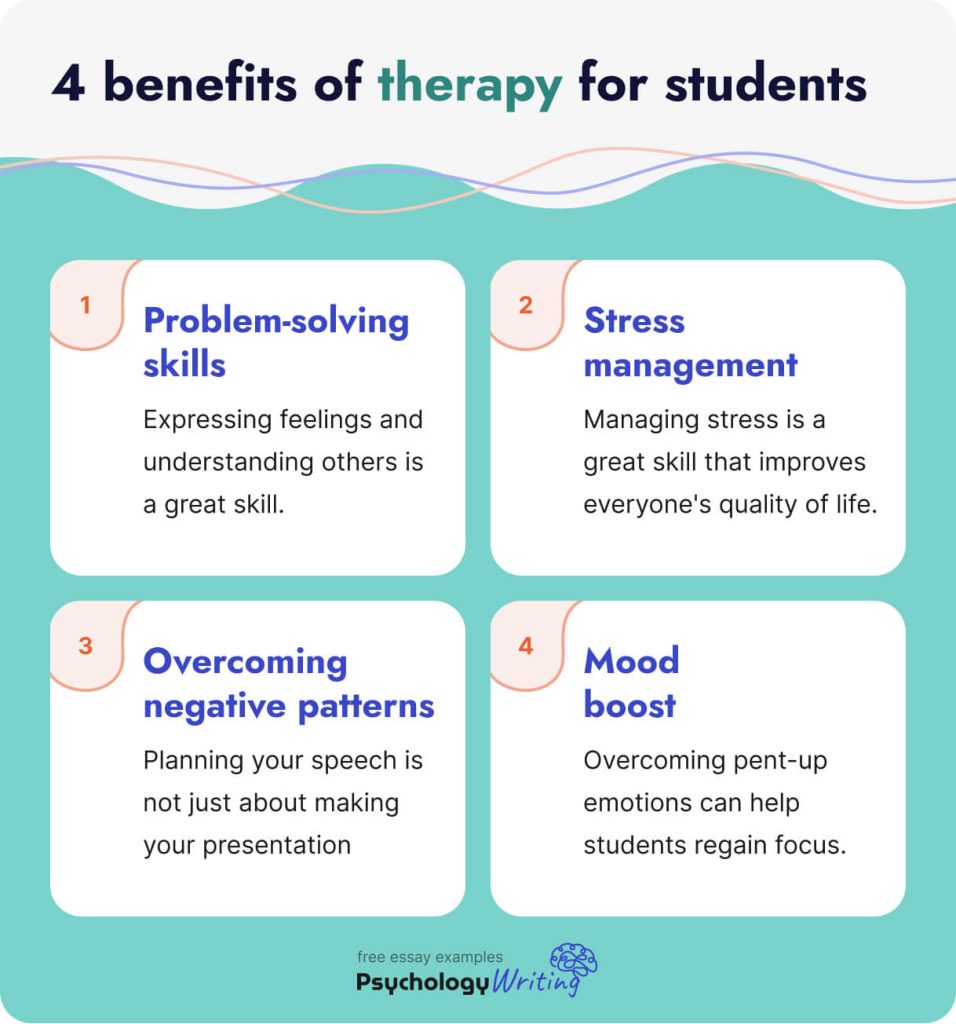
Counseling centers are available in many colleges and universities to help students cope and navigate college life. These services are often free or low-cost, depending on the institution.
Let’s take a look at the benefits of psychotherapy for college students:
🧠 5 Psychotherapy Techniques for Students
Psychotherapy is a treatment that uses verbal communication and human interaction to treat mental health conditions. It is also known as talk therapy, which involves talking with a therapist or school counselor.
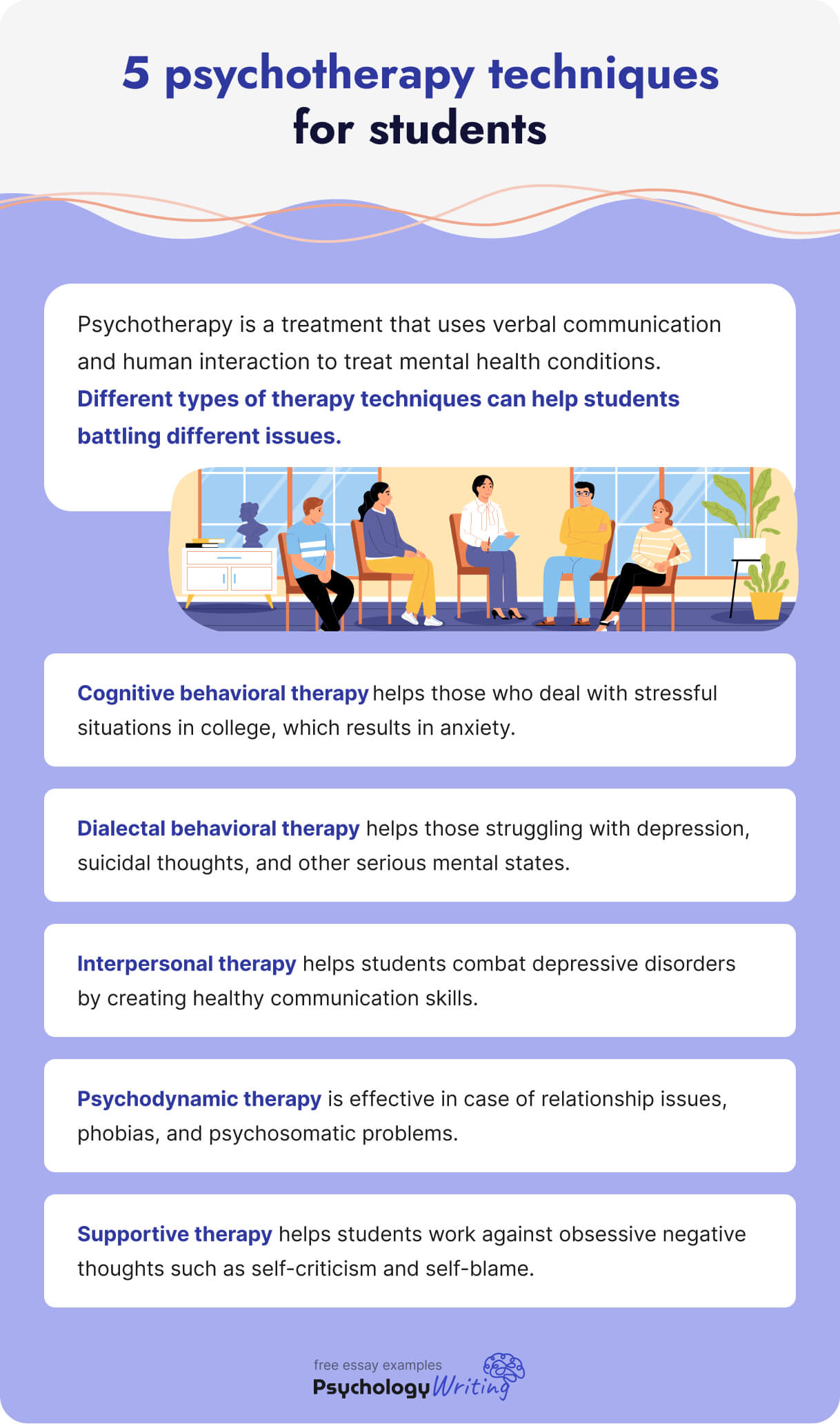
Different types of therapy techniques can help students battling various issues. Let us explore different techniques below.
Cognitive Behavioral Therapy
Cognitive behavioral therapy (CBT) primarily aims to recognize and modify patterns and behaviors that are harmful to your mental state. It is an effective approach that influences negative thoughts through meaningful changes. CBT is usually recommended for the treatment of anxiety-related disorders.
Many students often deal with stressful situations in college, resulting in anxiety. This could be because of academic pressure, a new environment, social life, or rising responsibilities.
Some of the symptoms of anxiety include:
- Fatigue and restlessness
- Excessive worrying
- Panic attacks and fear
- Irritability and tensed muscles
- Withdrawal from social situations
Students with the above symptoms can seek help and get CBT treatment. Working with a therapist will help you identify current issues that trigger anxiety and help you form positive patterns and habits. Apart from regaining your self-confidence, you will also learn to deal with challenging situations while staying optimistic about the outcome.
Dialectical Behavioral Therapy
Dialectal behavioral therapy (DBT) is a technique that combines cognitive behavioral therapy (CBT) and mindfulness and acceptance in dealing with challenging feelings. DBT is a structured technique recommended for students with emotional instability.
According to research, many college students are diagnosed with severe mental health issues.
Common issues include depression, borderline personality disorder, and suicidal thoughts. These conditions paralyze learners and interfere with their ability to perform. DBT is an effective approach with long-term benefits for students dealing with suicidal ideation.
DBT usually occurs in several settings, including:
- Group therapy. This is where students are taught behavioral skills in groups.
- Individual therapy. One-on-one sessions with the therapist in relation to an individual’s life challenges.
- Phone counseling. This entails talking to a therapist through telephone sessions.
This type of therapy technique is more serious and helps combat mental states where CBT may be ineffective.
Interpersonal Therapy
Interpersonal therapy (IPT) is a technique that focuses on assisting people battling personal issues that affect their social or professional life. Many students have depression due to study workloads and homesickness. This technique helps students combat depressive disorders by developing healthy communication skills.
IPT is a short-term treatment as it addresses a specific challenge the student is facing. It is focused on the fact that depression occurs because of environmental triggers such as relationship issues, adapting to new situations, or social isolation. These triggers affect many students, so IPT is a suitable therapy technique.
Students who work with a therapist in IPT often identify current issues and develop skills to deal with these problems. Over time, the student will understand and communicate their feelings while creating adaptive strategies to deal with their interpersonal issues.
Psychodynamic Therapy
Another effective therapy technique is psychodynamic therapy, which entails drawing on past events from childhood to determine if and how they affect your current behavior or patterns. The technique primarily focuses on an individual’s unconscious mind to reveal hidden patterns influencing their physical and mental state. Working with a therapist helps students understand and become aware of these negative patterns and address the triggers.
This therapy works with various mental health issues:
- Depression
- Anxiety disorders
- Relationship issues
- Phobias
- Psychosomatic problems
Psychoanalysis and psychodynamic therapy have similarities since both techniques work with the person’s unconscious mind and childhood traumas. However, the psychodynamic approach is a more modern technique that includes research from neo-Freudists, focusing more on the environment and conscious personality. It also entails talking to a therapist fact-to-face and is lengthier than traditional psychoanalysis.
Supportive Therapy
Supportive therapy focuses on providing support, listening, and managing the symptoms of mental health conditions. It generally helps students to deal with stressful events and work against obsessive negative thoughts such as self-criticism and self-blame. The therapist works to improve a person’s self-esteem and restore positive coping mechanisms to deal with stress triggers and challenges.
This technique treats:
- Anxiety
- Depression
- Relationship issues
- Emotional instability
- Personality disorders
Supportive therapy is less structured and lets the client feel comfortable with the counselor. Each session has agreed tasks and goals to be accomplished by the student to ensure active participation in the therapy session. Over time, the student adapts internal supportive mechanisms with the therapist’s help.
🕵️ 6 Tips to Find the Right Therapist
Psychotherapy is a sensitive treatment that requires integrity and professionalism. You must consider certain key criteria when looking for a therapist for effective treatment.
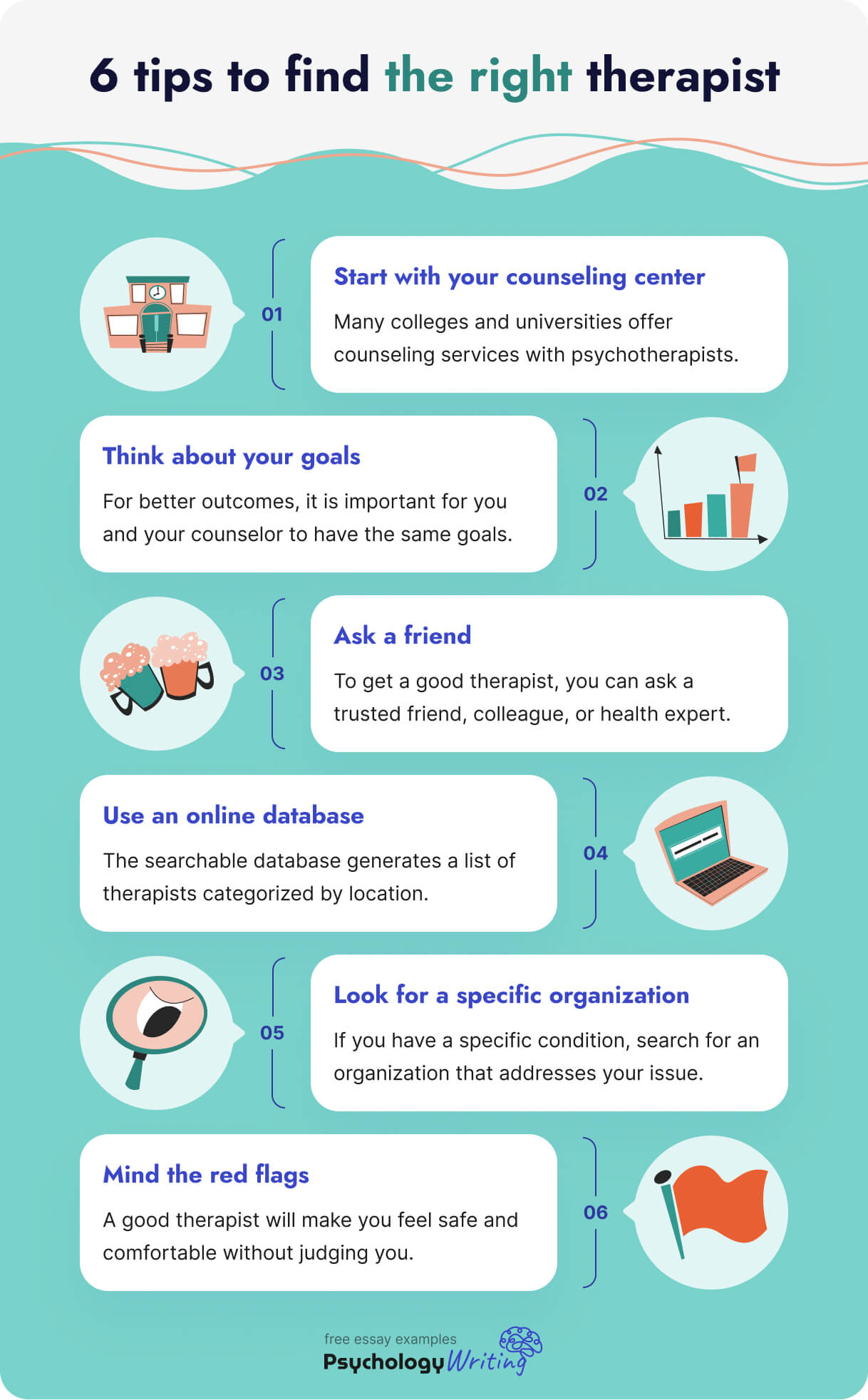
Here are some helpful tips to guide you in the right direction.
Start with Your Counseling Center
The school counseling center is the first place to look for a therapist. Many colleges and universities offer counseling services with professional therapists.
You should find out the types of services available at your school counseling center. Some offer individual counseling or group therapy. Whatever the case, such sessions are offered at an affordable rate or are available for free.
Normally, the therapist will offer a diagnostic consultation and recommend where the student should seek more help outside the campus. It is advisable to know if the college you want to join offers mental health support to students and policies regarding confidentiality.
You can seek help for various mental health issues. These include depression, homesickness, social anxiety, substance abuse, and eating disorders. As such, you can make an appointment whenever you feel your mental state is unstable.
Think about Your Goals
Another factor you must consider is your goals. What do you want to achieve in therapy? For better outcomes, it is important for you and your counselor to have the same goals. If you know of a type of medication or therapy technique you wish to try, share this with your therapist.
Ask a Friend
To get a good therapist, you can ask a trusted friend, colleague, or health expert. Referrals are often positive, with the therapist having good reviews from satisfied patients or students. However, ensure you understand your needs and goals even when looking for recommendations. Remember that a good match for your friend might not work for you.
Use an Online Database
Most mental health organizations have databases that students can use and get updated information on licensed therapists.
The searchable database generates a list of therapists categorized by location. You can use your ZIP code or search for specific specialists in areas such as substance abuse, marriage, or depression.
Look for an Organization that Addresses Your Issue
If you have a specific mental condition, searching for an organization that addresses your issue is advisable. Don’t go for a general therapist; you might not get optimal treatment. Some organizations handle particular mental health issues, such as the National Center for PTSD and the National Eating Disorders Association.
Mind the Red Flags
Whether your therapy sessions are virtual or physical, paying attention to red flags is vital. The space may seem uncomfortable and insecure, or you might experience panic attacks. A good therapist will make you feel safe and comfortable without judging you. Trust your gut. Red flags will let you know if the therapist is a good match for you.
🌐 Psychotherapy Resources for Students
In this section, you’ll find 4 powerful search tools as well as 5 disorder-specific organizations that will help you find a therapist.
4 General Resources
Below are online search tools that students can use when seeking psychotherapy help:
5 Disorder-Specific Organizations
Below are professional organizations that deal with specific mental health disorders:
Mental health issues are rampant among college students. It is important to understand the patterns and behaviors leading to depression, anxiety, and even suicide. Seeking help is vital in treating these mental conditions. Monitor your well-being on a regular basis and find the right therapist to help you navigate the challenges of college life.
🔗 References
- Students’ benefits and barriers to mental health help-seeking
- Stress in College Students: What to Know – USNews.com
- Do I Need Therapy? 14 Signs It’s Time to Talk It Out – Greatist
- Depression in Students: Symptoms, Causes, What to Do
- Different approaches to psychotherapy
- Psychotherapy Techniques and Options – Verywell Mind
- Psychotherapy: What It Is, Why It Is Done & Types

